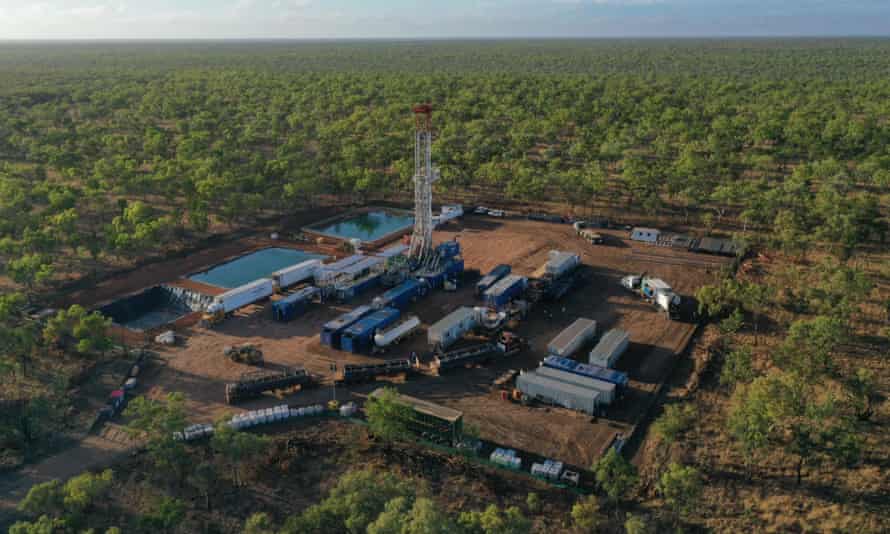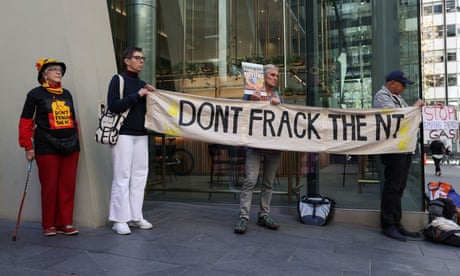‘Grave mistake’: climate scientists issue dire warning over Beetaloo Basin fracking plans
Gas projects must be halted if the Northern Territory government cannot meet promise to fully offset emissions, scientists say
The Protect Country Alliance spokesperson Graeme Sawyer said the argument of “commercial in confidence” was a joke, and a tactic often deployed by fracking companies in the US.
“It’s a particularly bogus argument in the NT, because the Pepper inquiry was unequivocal about the need for fracking companies to ‘report and publicly disclose’ the ‘identities, volumes and concentrations of chemicals to be used’,” he said.
“There are already too many communities across the NT, like Katherine, that are facing PFAS contamination disasters. We cannot allow one more drop of these forever chemicals to sink into Territory soil.”
CSIRO said the FOI had not directly sought information about chemicals being used in the Beetaloo. A spokesperson said the FOI Act’s exemptions for commercially valuable information and business affairs were used appropriately.
“The Protect Country Alliance’s application specifically sought access to documents obtained under those circumstances and as such the exemption has been appropriately applied.”
The climate scientists’ open letter will be published in the NT News on Wednesday.
It comes a day after the territory government published a progress report on climate action. The report does not mention offsetting new fracking developments.
Environment minister Eva Lawler told the Guardian it has accepted all 135 recommendations from the Pepper inquiry and will “work with the Commonwealth Government to seek to ensure that there is no net increase in emissions emitted in Australia”.
“As in any industry, private sector proponents will be responsible for offsetting their emissions,” Lawler said.
She said the Greenhouse Gas Emissions Management for New and Expanding Large Emitters policy, and draft Greenhouse Gas Emissions Offsets Policy, would noth help support the implementation of the offset recommendation.
“However they are not designed to deliver these outcomes on their own,” she said. “These policies are part of a suite of policy and regulatory initiatives being developed to decarbonise the Territory, and are intended to apply to all significant emitting developments in the Territory, not just the onshore gas industry.”
Gas projects must be halted if the Northern Territory government cannot meet promise to fully offset emissions, scientists say

An Empire Energy gas exploration well in the Beetaloo Basin. The Northern Territory government has given the company partial approval to begin works. Photograph: Department of Industry, Science, Energy and Resources
Christopher Knaus
@knausc
Wed 22 Sep 2021
More than 60 leading climate scientists have issued a dire warning over the plan to frack the Beetaloo Basin, saying it must be halted if the Northern Territory government cannot meet a promise to fully offset emissions.
The Morrison government is using $50m in grants to incentivise gas exploration in the Beetaloo Basin as part of its gas-led recovery, and the Northern Territory government has already provided one gas company, Empire Energy, with partial approval to begin works in the area.
In 2018, the landmark Pepper inquiry recommended that emissions from shale gas development in the territory be “fully offset so that there is no net increase in the lifecycle greenhouse gas emissions emitted in Australia from any onshore shale gas produced in the NT”.
The chief minister, Michael Gunner, committed to implementing the inquiry’s recommendations, but critics say his government’s climate policies still make no requirement for companies to offset the burning of gas.

NT government criticised for progressing Beetaloo Basin gas project without full environmental study
In an open letter to Gunner on Thursday, climate scientists warned that his government “must require all lifecycle greenhouse gas emissions in Australia from any onshore gas produced in the NT … to be fully and genuinely offset”.
One of the signatories, the Australian National University climate scientist Prof Will Steffen, warned that there was “absolutely no carbon budget left” for the emissions that would result from developing new oil and gas fields like the Beetaloo Basin.
“Every action we take now counts and allowing shale gas development in the Northern Territory is a big step in the wrong direction,” Steffen said.
Prof Ian Lowe, of Griffith University, warned it would be a “grave mistake” to open up “massive new sources of greenhouse gas like the Northern Territory’s Beetaloo Basin”.
“Offsets are a very poor substitute for keeping fossil fuels in the ground, but it would be appalling if the government is even trying to avoid requiring the companies involved to offset their emissions,” he said.
Meanwhile, the government’s premier scientific research agency, CSIRO, has been criticised for keeping secret a list of chemicals to be used in fracking in the basin.
Environmentalist group Protect Country Alliance lodged a freedom of information request asking for all communications between CSIRO and gas companies about a series of chemicals used in fracking.
The heavily redacted documents provided to the group appear to canvass a list of chemicals to be used in fracking in the Beetaloo. But details of the chemicals are suppressed, because CSIRO said the information was “commercially valuable information” and constituted “trade secrets”.
Christopher Knaus
@knausc
Wed 22 Sep 2021
More than 60 leading climate scientists have issued a dire warning over the plan to frack the Beetaloo Basin, saying it must be halted if the Northern Territory government cannot meet a promise to fully offset emissions.
The Morrison government is using $50m in grants to incentivise gas exploration in the Beetaloo Basin as part of its gas-led recovery, and the Northern Territory government has already provided one gas company, Empire Energy, with partial approval to begin works in the area.
In 2018, the landmark Pepper inquiry recommended that emissions from shale gas development in the territory be “fully offset so that there is no net increase in the lifecycle greenhouse gas emissions emitted in Australia from any onshore shale gas produced in the NT”.
The chief minister, Michael Gunner, committed to implementing the inquiry’s recommendations, but critics say his government’s climate policies still make no requirement for companies to offset the burning of gas.

NT government criticised for progressing Beetaloo Basin gas project without full environmental study
In an open letter to Gunner on Thursday, climate scientists warned that his government “must require all lifecycle greenhouse gas emissions in Australia from any onshore gas produced in the NT … to be fully and genuinely offset”.
One of the signatories, the Australian National University climate scientist Prof Will Steffen, warned that there was “absolutely no carbon budget left” for the emissions that would result from developing new oil and gas fields like the Beetaloo Basin.
“Every action we take now counts and allowing shale gas development in the Northern Territory is a big step in the wrong direction,” Steffen said.
Prof Ian Lowe, of Griffith University, warned it would be a “grave mistake” to open up “massive new sources of greenhouse gas like the Northern Territory’s Beetaloo Basin”.
“Offsets are a very poor substitute for keeping fossil fuels in the ground, but it would be appalling if the government is even trying to avoid requiring the companies involved to offset their emissions,” he said.
Meanwhile, the government’s premier scientific research agency, CSIRO, has been criticised for keeping secret a list of chemicals to be used in fracking in the basin.
Environmentalist group Protect Country Alliance lodged a freedom of information request asking for all communications between CSIRO and gas companies about a series of chemicals used in fracking.
The heavily redacted documents provided to the group appear to canvass a list of chemicals to be used in fracking in the Beetaloo. But details of the chemicals are suppressed, because CSIRO said the information was “commercially valuable information” and constituted “trade secrets”.
The Protect Country Alliance spokesperson Graeme Sawyer said the argument of “commercial in confidence” was a joke, and a tactic often deployed by fracking companies in the US.
“It’s a particularly bogus argument in the NT, because the Pepper inquiry was unequivocal about the need for fracking companies to ‘report and publicly disclose’ the ‘identities, volumes and concentrations of chemicals to be used’,” he said.
“There are already too many communities across the NT, like Katherine, that are facing PFAS contamination disasters. We cannot allow one more drop of these forever chemicals to sink into Territory soil.”
CSIRO said the FOI had not directly sought information about chemicals being used in the Beetaloo. A spokesperson said the FOI Act’s exemptions for commercially valuable information and business affairs were used appropriately.
“The Protect Country Alliance’s application specifically sought access to documents obtained under those circumstances and as such the exemption has been appropriately applied.”
The climate scientists’ open letter will be published in the NT News on Wednesday.
It comes a day after the territory government published a progress report on climate action. The report does not mention offsetting new fracking developments.
Environment minister Eva Lawler told the Guardian it has accepted all 135 recommendations from the Pepper inquiry and will “work with the Commonwealth Government to seek to ensure that there is no net increase in emissions emitted in Australia”.
“As in any industry, private sector proponents will be responsible for offsetting their emissions,” Lawler said.
She said the Greenhouse Gas Emissions Management for New and Expanding Large Emitters policy, and draft Greenhouse Gas Emissions Offsets Policy, would noth help support the implementation of the offset recommendation.
“However they are not designed to deliver these outcomes on their own,” she said. “These policies are part of a suite of policy and regulatory initiatives being developed to decarbonise the Territory, and are intended to apply to all significant emitting developments in the Territory, not just the onshore gas industry.”
No comments:
Post a Comment